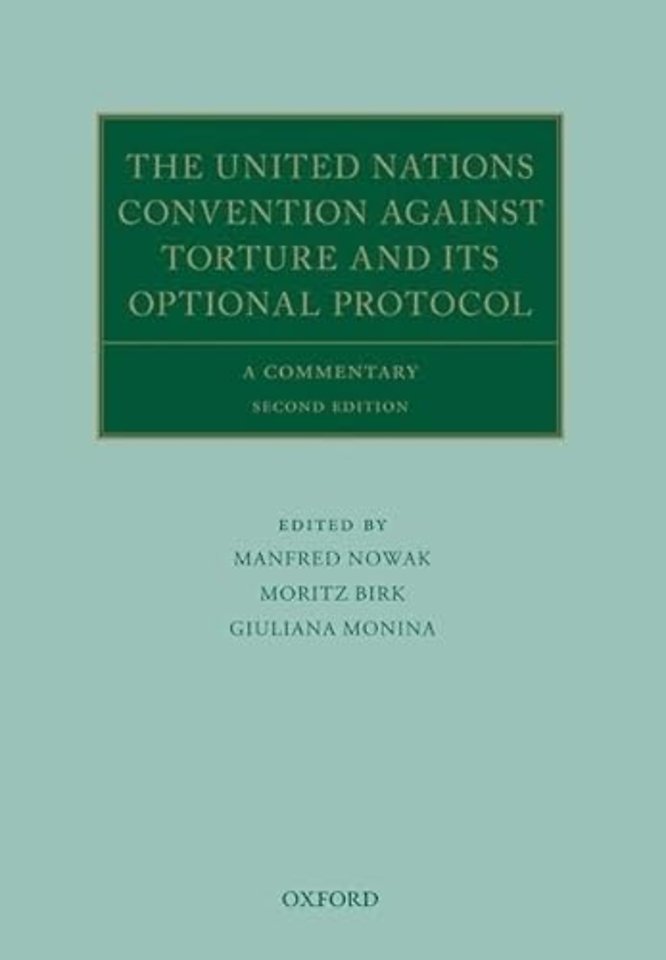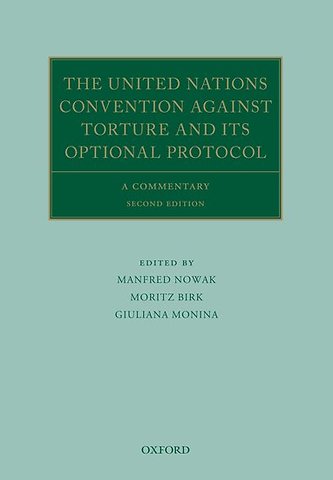



Manfred Nowak was appointed as independent expert leading the United Nations Global Study on Children Deprived of Liberty in October 2016.
Meer over de auteursThe United Nations Convention Against Torture and its Optional Protocol
A Commentary
Samenvatting
The prohibition of torture - the right to physical and mental integrity - is guaranteed in the strongest terms under international law. It is protected as an absolute right, non-derogable even in times of war or public emergency under many human rights treaties and is also generally accepted as a part of customary international law and even ius cogens. The main instrument to combat torture within the framework of the United Nations is the Convention Against Torture and other Cruel, Inhuman, or Degrading Treatment or Punishment (CAT).
This Commentary explores the problematic definition of torture in the Convention, the substantive obligations of States parties, the principle of 'non-refoulement', provisions for international monitoring, and also the concept of preventative visits to all places of detention as contained in the Optional Protocol to the CAT. It also covers issues including the distinction between torture and cruel inhuman or degrading treatment and the principle of non-admissibility of evidence extracted under torture. Full article by article commentary on the Convention also provides historical context and thorough analysis of case-law and practice from international and regional courts and monitoring bodies. Relevant case-law from domestic courts are also discussed.
Despite the broad ratification and the universal recognition of the prohibition of torture and other forms of ill-treatment we witness a 'global crisis' affecting the majority of countries worldwide. In recent years the protection of human rights is experiencing a particularly serious crisis - also affecting the phenomenon of torture - in which official narratives and public belief often trivialise and even endorse such practices in the name of security and the fight against terrorism, ignoring the suffering and damages it causes. On the other hand, the positive experiences in some States illustrate that torture can be eradicated if the provisions of CAT and OPCAT are taken seriously and are being fully implemented.
This is an open access title available under the terms of a CC BY-NC 4.0 International licence. It is offered as a free PDF download from OUP and selected open access locations.
Specificaties
Over Moritz Birk
Over Giuliana Monina
Inhoudsopgave
Convention Against Torture and Other Cruel, Inhuman or Degrading Treatment or Punishment
Preamble
Part I: Substantive Articles
Article 1. Definition of Torture
Article 2. Obligation to Prevent Torture
Article 3. Principle of Non-Refoulement
Article 4. Obligation to Criminalize Torture
Article 5. Types of Jurisdiction over the Offence of Torture
Article 6. Procedural Safeguards During the Preliminary Investigation Phase
Article 7. Aut Dedere aut Judicare
Article 8. The Convention as a Basis for Extradition
Article 9. Mutual Judicial Assistance
Article 10. Training of Personnel
Article 11. Review of detention and interrogation rules
Article 12. Ex Officio Investigations
Article 13. Right of Victims to Complain
Article 14. Right of torture victims to adequate remedy and reparation
Article 15. Non-Admissibility of Evidence Obtained by Torture
Article 16. Cruel, Inhuman or Degrading Treatment or Punishment
Part II: Procedural Articles
Article 17. Committee against Torture
Article 18. Rules of Procedure
Article 19. State Reporting Procedure
Article 20. Inquiry Procedure
Article 21. Inter-State Communications
Article 22. Individual Complaints Procedure
Article 23. Privileges and Immunities
Article 24. Annual Report
Part III: Final Clauses
Article 25. Signature and Ratification
Article 26. Accession and Succession
Article 27. Entry into Force
Article 28. Opting out of the inquiry Procedure
Article 29. Amendment
Article 30. Settlement of Disputes
Article 31. Denunciation
Article 32. Notification by the Secretary-General
Article 33. Authentic Texts
Optional Protocol to the Convention Against Torture and Other Cruel, Inhuman or Degrading Treatment or Punishment
Preamble
Part I: General Principles
Article 1. System of Preventive Visits to Places of Detention
Article 2. Establishment of a UN Subcommittee on Prevention
Article 3. National Preventive Mechanism
Article 4. Obligation to allow Preventive Visits to all Places of Detention
Part II: Subcommittee on Prevention
Article 5. Size and Composition of the Subcommittee on Prevention
Article 6. Nomination of Subcommittee Members
Article 7. Election of the Subcommittee
Article 8. Filling of Vacancies
Article 9. Term of Office
Article 10. Rules of Procedures
Part III: Mandate of the Subcommittee on Prevention
Article 11. Mandate of the Subcommittee
Article 12. Obligations of States Parties to Cooperate with the Subcommittee
Article 13. Obligations of the Subcommittee Concerning Country Missions
Article 14. Obligation of States Parties to Facilitate Visits by the Subcommittee to Places of Detention
Article 15. Prohibition of Sanctions against any Source of Information of the Subcommittee
Article 16. Reports of the Subcommittee
Part IV: National Preventive Mechanisms
Article 17. Establishment of National Preventive Mechanisms
Article 18. Independence, Pluralism and Efficiency of National Preventive Mechanisms
Article 19. Mandate and Power of National Preventive Mechanisms
Article 20. Obligations of States Parties to Facilitate Visits by the National Preventive Mechanisms
Article 21. Prohibition of Sanctions against any Source of Information of the NPM
Article 22. Obligation of States Parties to Examine the Recommendations of National Preventive Mechanisms
Article 23. Annual Report of the National Preventive Mechanism
Part V: Declaration
Article 24. Temporary Opting-Out Declaration
Part VI: Financial Provisions
Article 25. Financing of the Subcommittee
Article 26. Special Fund
Part VII: Final Provisions
Article 27. Signature, Ratification and Accession
Article 28. Entry into Force
Article 29. Validity in Federal States
Article 30. Prohibition of Reservations
Article 31. Relation to Regional Systems of Preventive Visits to Places of Detention
Article 32. Relation to the International Committee of the Red Cross
Article 33. Denunciation
Article 34. Amendments
Article 35. Privileges and Immunities
Article 36. Obligations of Members of the Subcommittee during Country Missions
Article 37. Authentic Texts
Appendices





